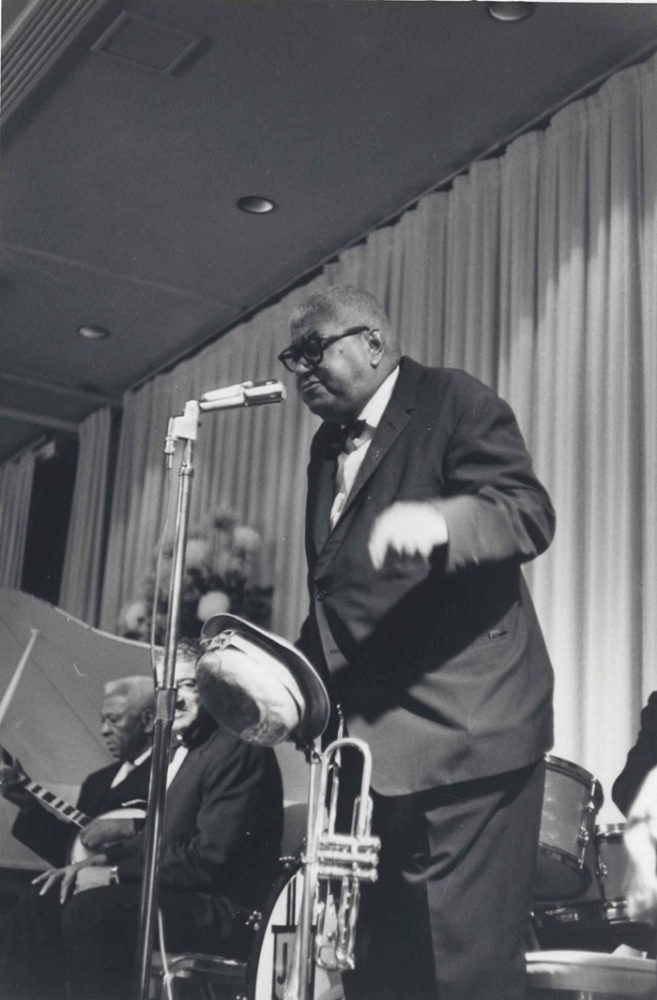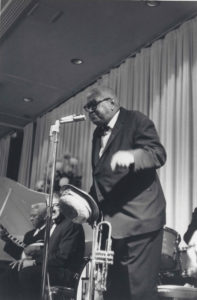Percy Humphrey
New Orleans traditional jazz trumpeter Percy Humphrey led the Eureka Brass Band and the Preservation Hall Jazz Band, continuing to play until the age of ninety.

Courtesy of Louisiana State Museum
Percy Humphrey at the Microphone. Unidentified
In addition to serving as leader of a number of his own bands during the course of his career, Percy Gaston Humphrey, a traditional jazz and brass band trumpeter from New Orleans, also famously served as the last leader of the Eureka Brass Band, with whom he recorded a number of classic albums, including 1962’s Jazz at Preservation Hall, Volume 1: The Eureka Brass Band of New Orleans. Both Humphrey and his brother, clarinetist Willie Humphrey, enjoyed musical careers that lasted well over seven decades, during which they performed—together and individually—with an endless list of New Orleans jazz greats. Percy Humphrey’s last public performance was at the New Orleans Jazz & Heritage Festival in 1995, only a few months prior to his death.
Humphrey was born on January 13, 1905, in New Orleans. The son of clarinetist Willie Eli Humphrey, Percy was the younger brother of clarinetist Willie Humphrey and trombonist Earl Humphrey, who died in 1971. Percy was also the grandson of Professor James Humphrey, an iconic figure responsible for teaching many of the first generation of musicians who would go on to shape the nascent jazz tradition in New Orleans. Humphrey’s jazz career would be built on his trumpet playing, but he actually started on drums before beginning trumpet lessons with his grandfather.
Among Humphrey’s first professional gigs was a job with Willie Cornish’s band in the early 1920s. In 1925 he organized his own dance orchestra and began playing occasionally with the Eureka Brass Band. In 1928 he joined Kid Howard’s orchestra and traveled to Chicago, Illinois, and elsewhere with that ensemble to perform.
The Great Depression of the 1930s was particularly hard on musicians and artists, and although Humphrey did tour briefly with classic blues singer Bessie Smith, upon returning to New Orleans he took a job as an insurance agent, a position he would hold for the remainder of his working years. After World War II Humphrey became the last leader of the Eureka Brass Band, with which he recorded the album New Orleans Parade in 1951. Around this time Humphrey also began performing with “Sweet” Emma Barrett at society parties, debutante balls, and the occasional Bourbon Street gig. From 1951 to 1953 Humphrey worked and recorded with clarinetist George Lewis, and was one of many musicians to record for Riverside Records’ Living Legends series in 1961. In 1962 Humphrey recorded with his brother Willie (clarinet), Kid Sheik Colar (trumpet), Peter Bocage (trumpet), Albert Warner (trombone), Oscar “Chicken” Henry (trombone), Emanuel Paul (tenor saxophone), Wilbert Tillman (sousaphone), Cié Frazier (snare drum), and others for Atlantic Records’ Jazz at Preservation Hall: The Eureka Brass Band of New Orleans.
The intervening years saw Humphrey performing with numerous dance bands and jazz ensembles, including as leader of the Crescent City Joymakers throughout the 1960s and early 1970s. In 1965 Humphrey released the classic album Climax Rag with the Joymakers, a group that included trombonist Big Jim Robinson, clarinetist Albert Burbank, banjoist George Guesnon, bassist Alcide Pavageau, and drummer Cié Frazier. Humphrey also played a central role in developing thePreservation Hall Jazz Band’s touring strategy beginning in 1964—a crucial factor in the Hall’s ultimate success. Humphrey and his brother Willie would play together often during this time, serving as co-leaders of the Preservation Hall flagship band in the 1970s, especially after the deaths of Billie and Dede Pierce in 1973 and 1974. The Humphrey brothers would lead a total of four Preservation Hall Jazz Band recordings for CBS.
Humphrey toured with the Preservation Hall Jazz Band into the 1980s. He continued to work regularly at Preservation Hall until March of 1995, just four months before his death on July 22 at the age of ninety.
